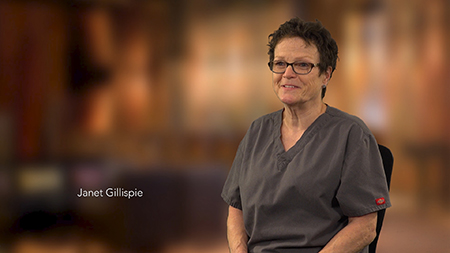Two videos created by employees of the School of Public Health at the University of Alabama at Birmingham have been accepted into the American Public Health Association’s annual film festival. Both videos highlight current issues in the region and showcase the role of public health in helping those affected.
The videos were written and directed by Elena Kidd and Meena Nabavi, program managers in the School of Public Health. Chris Simma, director of Online Education and Technology/Videographer produced the videos through the Instructional Technology Group.
“This is the first time that the School of Public Health has had video submissions accepted to the Public Health Film Festival at APHA,” said Nabavi. “We are raising awareness of critical public health issues that are impacting our community, and we’re doing this through a new medium.”
Homelessness is the theme in the first film and follows the journey of current UAB employee Janet Gillispie. In the video, Homelessness in Birmingham, Alabama: One Woman’s Story, Gillispie discusses her addiction to crack cocaine and the resources that she used to become sober and turn her life around.
 “Crack cocaine became my whole life, and I quit my job,” Gillispie said. “Once your money is gone and you aren’t paying your bills because of your addiction, I became homeless and was on the street panhandling. I then became a prostitute, living here and there or where I could get in for the night, even sometimes on the street. I did this for about 10 years.”
“Crack cocaine became my whole life, and I quit my job,” Gillispie said. “Once your money is gone and you aren’t paying your bills because of your addiction, I became homeless and was on the street panhandling. I then became a prostitute, living here and there or where I could get in for the night, even sometimes on the street. I did this for about 10 years.”
The turning point came the day her daughter was born.
“A healthy baby came out that had never had a prenatal vitamin, I never went to a doctor’s visit,” Gillispie explained. “I cried out to the nurses and doctors around me that I needed help and I was an addict.”
Social workers and the United Way arranged for her to enter a treatment program, where she spent six months. She then was put in touch with Pathways, an organization based in Birmingham that offers a range of services to homeless women and their children to help them rebuild their lives.
With the support of Pathways, she was able to live in her own apartment, start a new job at UAB, and most importantly to her, take care of her daughter. She says she wants to share her journey and raise awareness about the available resources to help other women who may be in similar situations.
“When I drive home and see someone homeless or people falling on hard times, I think, yesterday that was me,” Gillispie said. “If you are ready and are willing, you don’t have to stay out there. I never dreamed I could stop smoking crack cocaine, get my job back, let alone be able to keep my child and be a mom.”
The second video, Exploring Population Health While on the Road in the Deep South: A Student’s Perspective, is told from the perspective of a student who participated in a two week course that examined historical and contemporary public health issues across the southeast.
The course, which was led by Lisa McCormick, DrPH, associate dean for Public Health Practice in the School of Public Health, took students to four states and included visits to a nuclear site, a tuberculosis sanitarium, the lower ninth ward of New Orleans, and the Centers for Disease Control and Prevention.
| “If you are ready and are willing, you don’t have to stay out there. I never dreamed I could stop smoking crack cocaine, get my job back, let alone be able to keep my child and be a mom.” |
Claire Auriemma, a UAB student who is pursuing masters in both Public Health and Business Administration, says the course shaped the foundation of her understanding of public health.
“I had zero clue about how deeply this would impact me on a personal and professional level,” Auriemma explained. “It was an opportunity for us to go out into the field and see issues in real life. At every single stop along the way, I was able to see how the social determinants of health greatly impact health equity, health disparities and the health of entire populations.”
The videos will be shown during the APHA meeting from Nov. 2-6.
